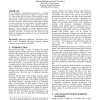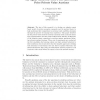144 search results - page 17 / 29 » Opponent Modeling in Poker |
ICANN
2005
Springer
14 years 1 months ago
2005
Springer
Humans can recognize biological motion from strongly impoverished stimuli, like point-light displays. Although the neural mechanism underlying this robust perceptual process have n...
ECAI
2004
Springer
14 years 1 months ago
2004
Springer
Many decision problems can be modelled as adversarial constraint satisfaction, which allows us to integrate methods from AI game playing. In particular, by using the idea of oppone...
ITS
2000
Springer
13 years 11 months ago
2000
Springer
We are designing a computational architecture for a "learning economy" based on personal software agents who represent users in a virtual society and assist them in find...
AAAI
2007
13 years 10 months ago
2007
This paper introduces an innovative approach for automated negotiating using the gender of human opponents. Our approach segments the information acquired from previous opponents,...
AE
2003
Springer
14 years 1 months ago
2003
Springer
The aim of this research is to develop an adaptive agent based model of auction scenarios commonly used in auction theory to help understand how competitors in auctions reach equil...


